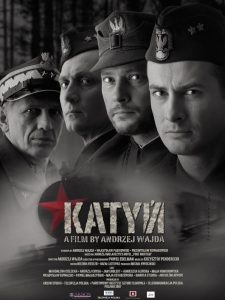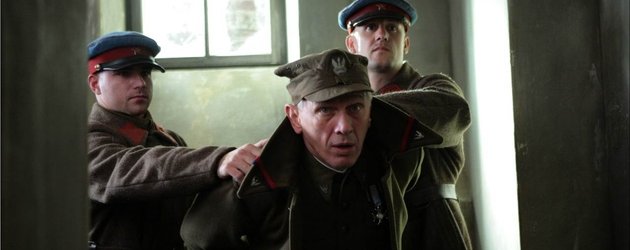
In 1940, after the German army invaded Poland from the west, the Soviet army invaded Poland from the east, presumably to take advantage of the imminent Polish defeat at the hands of the Nazi onslaught. The Polish soldiers were ordered not to engage the Soviets, and so as the columns of troops passed, they came to be prisoners on their own land. Anywhere from 300,000 to 500,000 men were taken prisoner as Poland once more vanished from the world map. Though the prisoners were assured that they would all be released soon enough to defend their homeland, there was a sinister selection process underway, overseen by Lavrentiy Beria and Joseph Stalin. Most of them were set free during a series of examinations and interrogations, each series determining their level of skill, education, fortitude, and determination to fight for an eventual free Poland. This process was complicated by the Polish law requiring all unexempted university graduates to enlist, meaning that the bulk of Polish, Ukrainian, Jewish, and Georgian intelligentsia were swept up with the rest of the soldiers; professors, doctors, lawyers, engineers, technological specialists of various disciplines found themselves at the business end of a gun.
According to a memo from Beria to Stalin, it was thought advantageous to exterminate the best and brightest of Poland so that when the Germans were beaten back, the remaining Poles would be far easier to control. This is, as it must be, an essential step to achieving domination of a people: destruction of the intellectual class. Over 22,000 men were executed in Katyn Forest, and buried in mass graves, in an event that has been acknowledged by the Russian nation, but not fully understood by the Polish one. Far from a remote history lesson, Katyn is a living wound that demonstrates how one nation can sabotage another. Indeed, murdering the intellectual class can ruin a country for a generation.
The opening sequence perfectly captures the uneasy position that Poland has occupied through the ages; a bridge outside of Krakow is being crossed by a throng of people fleeing the German advance. Midway across, they are met by a herd of people fleeing the Soviet advance in the other direction. It is difficult to choose between hostile aggressors when they both enthusiastically believe in concentration camps.
Katyn focuses upon a group of people connected by those caught in the massacre. Most of these are wives, sisters, daughters of those murdered. One woman travels the breadth of Poland to find her husband, pleading with him to escape the poorly guarded group of Polish officers and go into hiding. Whether in the name of duty to his fellow inmates or the genuine belief that they would all be freed and returned to the front to fight the Germans, he stays, and documents what is to come. The women await the return of their men, and then cope with the awkwardly delivered news of their death. The brusque and standardized delivery of this news (by loudspeaker, newspaper, or personal courier) becomes a tool of propaganda as the Soviets claim the Germans perpetrated the massacre. Then, the German propaganda machine attempts to lay blame with the Soviets. The graves are exhumed twice, once by each power, each presided upon by experts who note that the men were dispatched with a bullet in the back of the head, a trademark of how the other side kills their enemies. Such is Andrzej Wajda’s gruesome sense of humor.
Wajda has spent an illustrious career considering the history of Poland, a task that no doubt requires the deepest cynicism. He brings a somber eye, sardonic wit, and a taste for the macabre, lending his films a feel that lies somewhere between historical drama and horror flick. One gets the impression that there is very little good news available within the troubled borders of Poland, which has held a strange place in European history. On one occasion it will play a pivotal role, on another its nobles submit to partitioning by Germany, Russia, and Austria and the country vanishes from the global stage for a generation.
Still, he honors the stubborn nature of its citizens with Katyn, and their often futile resistance to inexorable forces. For those who survived the massacre, they attempt to piece together what happened, and keep the truth alive. One woman erects a gravestone bearing an epitaph for her brother that marks the date and place of his death and who was to blame. The wife of a general refuses to read aloud a German statement that her husband was murdered in Katyn by the Soviets; true enough, but she would not be a propaganda tool for anyone. A young man tears down a poster assuring the people of a town that the Soviets are friends of Poland (just don’t mind the informers and spies). A widow receives the diary of her husband who documented his last days before transport to Katyn Forest, which makes clear who the perpetrators are. Each of these people meet their bleak fates as anti-Communist agitators, no doubt on their way to internment camps or one of many unmarked graves, but to shun such resistance is to deny one’s identity. That way madness lies, as was found by a Polish officer who survived the massacre by becoming a loyal Soviet soldier. Denial of one’s identity only works if that person is dimwitted enough to forget who they are; nobody can carry that lie for long without climbing the walls.
That officer, who conveys the diary to that widow, represented the whole of Poland. Consumed by compromise, but never comfortable with it. Eventually the Soviet Union acknowledged their role, and that of the NKVD intelligence forces in the massacre in 1990 as the Soviet empire underwent collapse. Even so, they refused to accept that it was a war crime, genocide, or even Stalinist repression, as that would imply prosecution of the surviving guilty would soon follow. With the death of the Soviet Union, the unearthing of the truth about Katyn Forest, and the rise of a deeply scarred Poland, those graves were filled with more than bodies. The hope for the future was murdered there; the finest military talent, the intellectuals, university professors, doctors, engineers, and all the people who solve problems and make society run smoothly were silenced.
